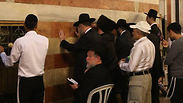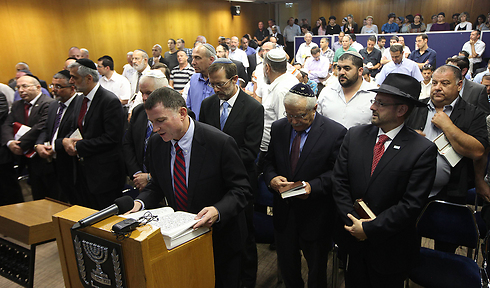

The Chayei Sarah (Life of Sarah) Torah portion begins with a real estate deal made thousands of years ago in "Kiryat Arba, which is Hebron" (Genesis 23:2). And this deal is why I live here, and why tens of thousands flocked this week to touch "the field of Ephron, which was in Machpelah… the field and the cave that was in it, and all the trees that were in the field" – the first Hebrew asset in the Land of Israel, the Jewish people's deed to its historical homeland.
Which other nation has an asset of this kind – not a dead relic, but a living and vibrant spring, active and relevant, a tangible link to the current of spiritual revolution that burst forth from this place nearly 4,000 years ago and continues to sustain our nation and the world?
This past Saturday was one of the 10 days during the year on which "the cave" is entirely open to Jews, with the Muslims having their own 10 days a year too. The Muslims are partners to the deal because the Arabs are believed to have descended from Ishmael, Abraham's eldest son.
During the initial centuries of Ishmael's rule, all was well in terms of coexistence at the site, as befits a relationship between siblings – with the attitude of Saladin, defeater of the Crusaders, particularly noteworthy. But ever since the days of the Mamluks, for more than 800 years, Ishmael has disowned Isaac, expelling him from the cave and leaving him nothing but seven steps outside.

Such was the case during 400 years of Turkish rule; and such was the case during the 30 years of the Mandate of the British, who ascribed to the "national home for the Jewish people," but left the landlord on the outside. And don't forget the shadow, too, of the 1929 Massacres, before "the Palestinian refugees," before the "occupation" and the Jewish state.
Following the victory of 1967, when Isaac's turn came, he never considered sending Ishmael out to the seventh step. He opened the entrances to the cave to everyone; but the attempt failed. Again and again, Jewish settlers were killed and Torah scrolls were desecrated; and in 1994, the imaginary coexistence was blown apart by the horrific massacre perpetrated by Baruch Goldstein. The Shamgar Commission advised dividing the cave – and, in a break from the norm, the recommendation was upheld. For 20 years now, the two peoples have been sharing the site sacred for them, but separately.
However, it's not true to say that relations between Jews and Arabs in Hebron are characterized only by hatred and alienation.
In the 42 years we have been here, my family and I have had warm ties with quite a few of our Arab neighbors. We've helped and we've received help; we've attended one another's joyous occasions; we've been their guests in their vineyards in the summer; and we've always received help from them with road accidents or when we've been stuck in the snow. The firefighting services of the municipalities assist one another, and ambulances from Kiryat Arba frequently transport emergency cases from Hebron.
After the Oslo Accords created a divide between the cities, Arabs from Hebron opened a line of stores and businesses opposite Kiryat Arba, just across the street - garages, a carpentry business, an upholstery enterprise, a building materials store, a vegetable market and two dentists. After the Jews were given the go-ahead to move into Hebron's Peace House, which is slated to be home to a large number of families in the future, anarchists from the outside tried to incite riots, but to no avail. On the contrary, Arab craftsmen offered their services in renovating the building.
The situation, nevertheless, is far from idyllic. Hebron residents who have befriended Jews and earn a livelihood from them will also tell you that when they regain control over the cave, they will send the Jews back to the seventh step.
And this is the lesson to be learned from the implementation of the Shamgar Commission's conclusions: When faced with no alternative, they adjust – provided that their adjustment doesn't promote negotiations and, God forbid, lead to an agreement. Formally, they can't forgo any demand. But in retrospect, de facto, and outwardly against their will, "We want to live." Hence, the Jewish insistence on a solution is the problem, not the solution.
We returned to the land owned by our forefathers in the field of Machpelah without requesting Ishmael's permission. Had we asked such a ridiculous question, he would have sent us packing to the seventh step.















